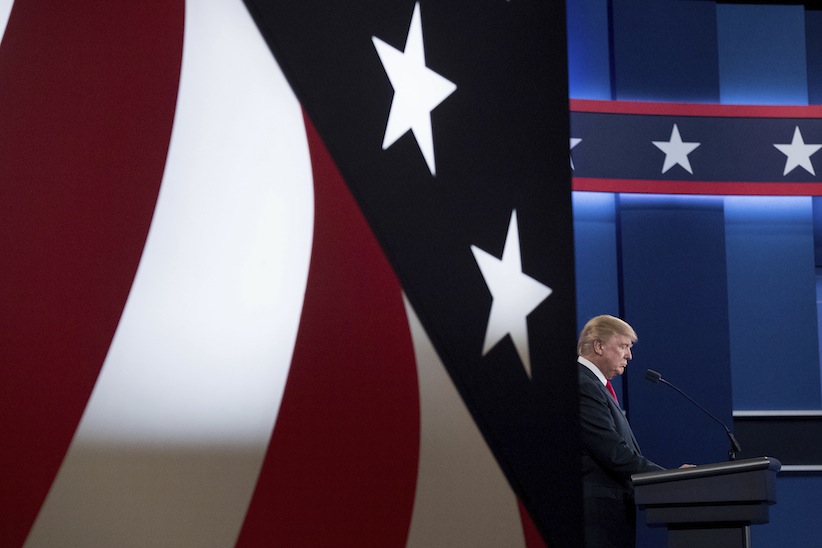Donald Trump’s lonely moment of truth
He began the debate sticking to a script, then he returned to type, and by the end came the realization: he is not a president
Republican presidential candidate Donald Trump takes the stage for the third presidential debate at University of Nevada in Las Vegas, Wednesday, Oct. 19, 2016, for the third presidential debate. (AP Photo/Andrew Harnik)
Share

Does Donald Trump know that he is losing the election?
His campaign team won’t tell him that, I’m sure of it. He is surrounded by people who rely entirely on his favour; the flotsam and jetsam of the American political world, the unemployables and the bottom feeders. People like Stephen Bannon, the anti-Semitic conspiracy peddler from Breitbart News, or Roger Ailes, the disgraced former head of Fox.
And Trump is the sort of captain who throws you out of the life raft if you suggest the ship has sunk. He has changed campaign managers an unprecedented three times so far, and I assume each tried to be even more reassuring than the last.
The question is, when Trump’s people say it’s going great, does he believe them? He is no fool. In some ways, he’s a genius. He has the ability of a great entertainer to understand an audience and play a crowd. His instincts for self-promotion are preternatural. He’s also well educated. All of this is to say the man can surely understand polling data. And his frequent attacks on the polls mean he has indeed seen them.
So, when Trump reads that he is now trailing far behind Clinton, at a level lower than any Republican presidential candidate in 80 years, does he believe it? When the New York Times, FiveThirtyEight, and RealClearPolitics all write he has less than a 15 per cent chance of winning, does he wince?
This is what I was wondering when Trump and Hillary Clinton walked on to the debate stage tonight. Would Trump, knowing he is losing the election, use the night to expand his base, to sway moderates? Or does he believe he is already marching to victory, and would therefore continue to pander to his base with his well-worn call-and-response routine?
Earlier in the day, when his team announced the list of sideshow attractions they were bringing to the debate—Obama’s Muslim half-brother, a woman accusing Bill Clinton of rape, the widow of a soldier killed at Benghazi—I assumed it would be more of the same; more sneering and snide remarks, more wild accusations and even wilder lies.
But that’s not what happened. At first. Trump came prepared. He was serious, even subdued. And it worked. For the first half of the debate, Trump came off as a relatively reasonable contender for the Oval Office. He avoided any serious gaffes, kept his rhetoric under control, and did well on a few exchanges, mostly notably on the border and the problem of illegal immigration.
It looked, for a long while, like Trump knew he needed to win tonight, not just in the hearts of his fanatical base, but in the eyes of the undecided voters, of the moderate Republicans, and the disenchanted Democrats. It looked like he was trying.
With some effort, Trump was holding his own. He was not as well practised as Clinton, that was obvious (though inexplicable given they both received the debate topics in advance). And he avoided nuance and detail. But, nonetheless, Trump was competing.
Clinton watched Trump perform almost dispassionately. And then she ended it. She began to bait him. First by saying he was Putin’s puppet. He couldn’t help himself. He literally sputtered and with a red face, childishly retorted, “No! You’re the puppet!”
Clinton couldn’t even hide a smile. It was too easy. Trump tried to be presidential. He knew he was losing. He wanted to win the debate. He wanted to do what his campaign team, as timid as they might be, surely hinted was necessary: to keep his cool, to make his case, to fight for voters. But he just couldn’t do it. And Clinton knew that.
For the rest of the debate, Trump returned to type. He was angry, resentful and glared at Clinton as she spoke, refuting accusations with obstinate denials. He got more and more worked up. When pressed, he refused, unbelievably, to say whether he would even accept the results of the election. And near the end, he fumed and called Clinton “a nasty woman.”
For the first time, I actually felt sympathy for Trump. It was clear that he walked onto the stage knowing he was losing. He began the debate knowing who he is and that he needs to change. And he tried. But he just couldn’t. Trump is Trump. He’s a father. He’s a businessman. He’s a reality TV star. But he is not a U.S. president. And no amount of money or ambition can change that.
There was a moment, after it was all over, after he had left the podium, and shaken the moderator’s hand, when he stood alone on the stage and watched Clinton as she waded into the audience, and he looked old and beaten. For that one moment he looked like a man who knew who he was, and who he wasn’t. It’s a moment we all eventually face. And tonight, Trump did too.